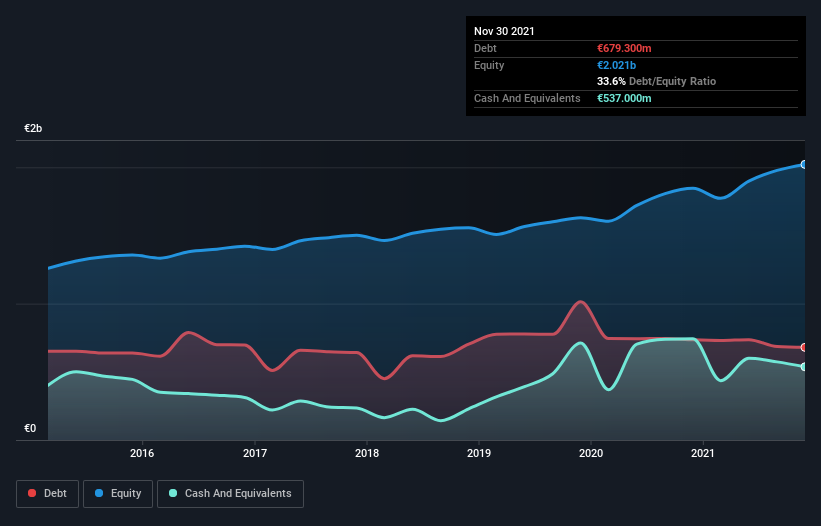- Germany
- /
- Specialty Stores
- /
- XTRA:HBH
These 4 Measures Indicate That HORNBACH Holding KGaA (ETR:HBH) Is Using Debt Extensively

The external fund manager backed by Berkshire Hathaway's Charlie Munger, Li Lu, makes no bones about it when he says 'The biggest investment risk is not the volatility of prices, but whether you will suffer a permanent loss of capital.' So it might be obvious that you need to consider debt, when you think about how risky any given stock is, because too much debt can sink a company. We note that HORNBACH Holding AG & Co. KGaA (ETR:HBH) does have debt on its balance sheet. But the real question is whether this debt is making the company risky.
What Risk Does Debt Bring?
Debt assists a business until the business has trouble paying it off, either with new capital or with free cash flow. In the worst case scenario, a company can go bankrupt if it cannot pay its creditors. While that is not too common, we often do see indebted companies permanently diluting shareholders because lenders force them to raise capital at a distressed price. Of course, debt can be an important tool in businesses, particularly capital heavy businesses. The first step when considering a company's debt levels is to consider its cash and debt together.
See our latest analysis for HORNBACH Holding KGaA
How Much Debt Does HORNBACH Holding KGaA Carry?
As you can see below, HORNBACH Holding KGaA had €679.3m of debt at November 2021, down from €734.6m a year prior. However, because it has a cash reserve of €537.0m, its net debt is less, at about €142.3m.

A Look At HORNBACH Holding KGaA's Liabilities
Zooming in on the latest balance sheet data, we can see that HORNBACH Holding KGaA had liabilities of €803.5m due within 12 months and liabilities of €1.45b due beyond that. Offsetting these obligations, it had cash of €537.0m as well as receivables valued at €69.5m due within 12 months. So its liabilities total €1.64b more than the combination of its cash and short-term receivables.
This is a mountain of leverage relative to its market capitalization of €2.06b. Should its lenders demand that it shore up the balance sheet, shareholders would likely face severe dilution.
We use two main ratios to inform us about debt levels relative to earnings. The first is net debt divided by earnings before interest, tax, depreciation, and amortization (EBITDA), while the second is how many times its earnings before interest and tax (EBIT) covers its interest expense (or its interest cover, for short). This way, we consider both the absolute quantum of the debt, as well as the interest rates paid on it.
HORNBACH Holding KGaA has net debt of just 0.34 times EBITDA, indicating that it is certainly not a reckless borrower. And this view is supported by the solid interest coverage, with EBIT coming in at 7.1 times the interest expense over the last year. But the bad news is that HORNBACH Holding KGaA has seen its EBIT plunge 19% in the last twelve months. We think hat kind of performance, if repeated frequently, could well lead to difficulties for the stock. When analysing debt levels, the balance sheet is the obvious place to start. But ultimately the future profitability of the business will decide if HORNBACH Holding KGaA can strengthen its balance sheet over time. So if you want to see what the professionals think, you might find this free report on analyst profit forecasts to be interesting.
But our final consideration is also important, because a company cannot pay debt with paper profits; it needs cold hard cash. So the logical step is to look at the proportion of that EBIT that is matched by actual free cash flow. During the last three years, HORNBACH Holding KGaA produced sturdy free cash flow equating to 57% of its EBIT, about what we'd expect. This cold hard cash means it can reduce its debt when it wants to.
Our View
HORNBACH Holding KGaA's EBIT growth rate was a real negative on this analysis, although the other factors we considered cast it in a significantly better light. In particular, its net debt to EBITDA was re-invigorating. When we consider all the factors discussed, it seems to us that HORNBACH Holding KGaA is taking some risks with its use of debt. So while that leverage does boost returns on equity, we wouldn't really want to see it increase from here. The balance sheet is clearly the area to focus on when you are analysing debt. However, not all investment risk resides within the balance sheet - far from it. Be aware that HORNBACH Holding KGaA is showing 1 warning sign in our investment analysis , you should know about...
At the end of the day, it's often better to focus on companies that are free from net debt. You can access our special list of such companies (all with a track record of profit growth). It's free.
Valuation is complex, but we're here to simplify it.
Discover if HORNBACH Holding KGaA might be undervalued or overvalued with our detailed analysis, featuring fair value estimates, potential risks, dividends, insider trades, and its financial condition.
Access Free AnalysisHave feedback on this article? Concerned about the content? Get in touch with us directly. Alternatively, email editorial-team (at) simplywallst.com.
This article by Simply Wall St is general in nature. We provide commentary based on historical data and analyst forecasts only using an unbiased methodology and our articles are not intended to be financial advice. It does not constitute a recommendation to buy or sell any stock, and does not take account of your objectives, or your financial situation. We aim to bring you long-term focused analysis driven by fundamental data. Note that our analysis may not factor in the latest price-sensitive company announcements or qualitative material. Simply Wall St has no position in any stocks mentioned.
About XTRA:HBH
HORNBACH Holding KGaA
Through its subsidiaries, develops and operates do-it-yourself (DIY) megastores with garden centers in Germany and other European countries.
Flawless balance sheet with proven track record.
Similar Companies
Market Insights
Community Narratives



